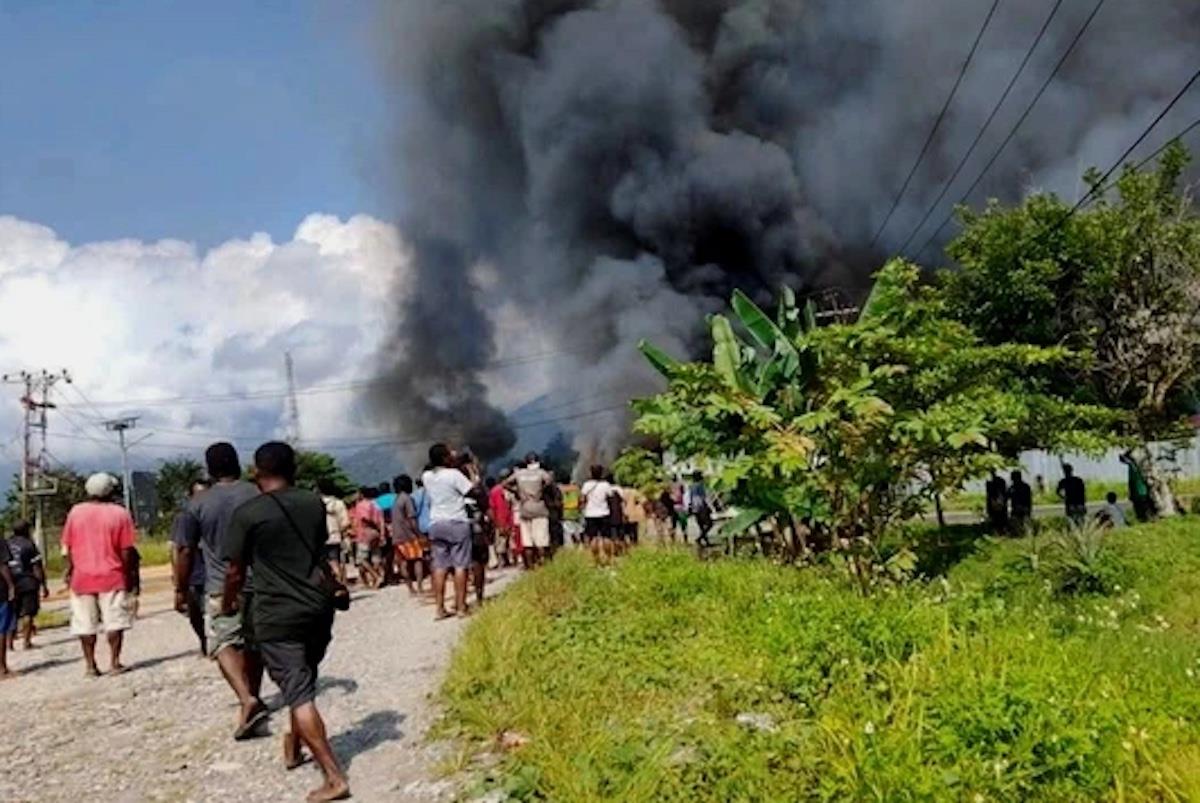Yalimo Tragedy Exposes Indonesia's Failed Pluralism In Papua
But more dangerous is what it stoked: an unresolved divide between Indonesia's constitutional promise of unity and the experience of many Papuans . This is not a local dispute to be addressed by emergency aid; it is a national challenge of whether pluralism can become real beyond mere words.
Indonesia was founded on the promise of“Bhinneka Tunggal Ika” -“unity in diversity” in Bahasa - and its constitution forbids racial discrimination. The state officially recognizes some 1,331 ethnic groups, and the post-1997-98 financial crisis-sparked reformasi era widened civic space in ways that once felt unimaginable.
Yet patterns persist: repeated episodes of anti-Papuan harassment in Java, the 2019 dormitory attacks that sent thousands of Papuan students home in fear and the more prominent communal clashes elsewhere in the archipelago – including the Sampit violence in Kalimantan and the anti-Chinese violence of 1998 –all reveal a recurring dynamic in which economic grievances, demographic shifts and toxic rumors turn identity into a fault line .
Human-rights monitors and UN experts have repeatedly warned of“deeply entrenched discrimination” against Papuans. Yalimo is the latest, stark confirmation.
If Indonesia is to move beyond mere rhetoric about tolerance , it must do three things simultaneously: make education the frontline of prevention, ensure the law is transparent and fair, and guarantee that local governance is inclusive and accountable.
First, education should be redesigned as democratic infrastructure. Curricula must include diverse histories, civic literacy and media resilience from the earliest years. Teacher training should prepare educators to mediate differences rather than inflame conflicts.
Latest stories
Trump's Gaza plan just another Middle East fantasy

Trump's Bagram gambit is all about China

Tomahawks for Kyiv: a dangerous idea
Practical pilots - such as mother-tongue early literacy programs in remote Papuan districts, exchange initiatives bringing Papuan and Javanese students together and vocational pathways linked to local economies - are inexpensive preventive measures compared to a destroyed village.
UNESCO's guidance on intercultural education and Sustainable Development Goals (SDG) targets on equitable, quality education offer immediate blueprints Jakarta can expand.
At the same time, the state must enforce anti-discrimination laws swiftly and visibly. Indonesia's penal code and hate speech provisions already criminalize incitement on SARA (Ethnicity, Religion, Race and Intergroup Relations) grounds, but enforcement remains uneven: victims often receive only belated apologies, while symbols of Papuan identity are often treated as security threats.
That selective application corrodes trust. The remedy is procedural: independent, public investigations for SARA incidents; transparent prosecutions when evidence supports them; and prompt, dignified compensation and rehabilitation for victims. Make prosecutions, not silence, the predictable outcome when race-based abuse tips toward violence. That is the clearest signal the rule of law can send.
As a further step, rebuild local social contracts through inclusive governance and equitable development. Papua's chronic underinvestment , seen in persistent gaps in health, education and infrastructure, is the long fuse behind episodic flare-ups. Special autonomy was intended to devolve power and revenue, but implementation has been halting.
Recommit to transparent revenue sharing from resource projects, legally recognize adat institutions' land rights where appropriate and tie public procurement and hiring to measurable local employment targets. Simple, accountable local budgets that deliver clinics, classrooms and culturally appropriate services shift incentives away from grievance and into stakeholding.
Beyond these three pillars, the state must demonstrate its seriousness. It should urgently establish a national task force led by the Ministry of Home Affairs and National Commission on Human Rights to publish a comprehensive Yalimo incident report with provisional findings and coordinate an immediate, dignified relief plan for victims.
Roll out rapid intercultural teacher training across affected districts and create a public dashboard that tracks SARA complaints, prosecutions and case outcomes so justice is visible, not whispered. Fund and launch pilots in mother-tongue early literacy and interprovincial student exchanges to rebuild everyday trust.
Order a transparent audit of special autonomy revenue flows in Papua so communities see that resources reach them. Make these measures unmistakable signals: sympathy must be converted into accountability, and words into protection.
Indonesia should also learn from comparative practices without mimicry. Australian multicultural programs and anti-discrimination frameworks offer techniques - community harmony grants, mandated anti-bias curricula, hate-crime registries - that can be adapted to the Indonesian archipelago's scale and complexity.
Equally, restorative justice mechanisms and community reconciliation models used elsewhere show that criminal justice must be coupled with rituals of repair: apologies, truth-telling and local agreements that rebuild trust between communities. These are not sentimental gestures; they are politically smart tools to defuse cycles of retribution.
Above all, this is both an international and domestic obligation. Indonesia's claim to moral leadership within ASEAN and on the global stage rests in part on its pluralist model. If Jakarta fails to address racism at home, its credibility in promoting religious tolerance and human rights abroad will fade.

Sign up for one of our free newsletters
-
The Daily Report
Start your day right with Asia Times' top stories
AT Weekly Report
A weekly roundup of Asia Times' most-read stories
Conversely, decisive reforms that prevent another Yalimo will be a model for diverse democracies worldwide – showing how to turn heterogeneity from a governance challenge into a competitive advantage.
UN human rights mechanisms, the Global Centre for Pluralism and civil-society partners should be invited to help design, monitor and evaluate reforms - not as an erosion of sovereignty, but as a cooperative investment in resilience.
Yalimo should mark a turning point, not just a headline. The republic must decide whether its pledge of unity in diversity is empty rhetoric or a genuine commitment. That decision is practical: fund classrooms and clinics, prosecute those who spread hatred, decentralize power fairly and teach the next generation to see difference as an asset rather than a threat.
If it does, Indonesia will better embody its foundational philosophy of Pancasila, with social justice, unity and equality at the core of its national identity.
If it doesn't, the country will repeatedly pay the price for a promise left unfulfilled. The time for action is now – morally, politically and strategically – and the true test will be whether leaders make reform unavoidable, not optional.
Kurniawan Arif Maspul is a researcher and interdisciplinary writer focusing on Islamic diplomacy and Southeast Asian political thought. He holds an MEd in advanced teaching, an MBA and MA in Islamic Studies, and is currently pursuing a Master's in Islamic Banking and Finance at Al-Madinah International University in Malaysia. His articles have appeared in ASPI's The Strategist, Lowy Institute's The Interpreter and Southeast Asian academic forums.
Thank you for registering!
An account was already registered with this email. Please check your inbox for an authentication link.
-
Click to share on X (Opens in new window)
X
Click to share on LinkedIn (Opens in new window)
LinkedIn
Click to share on Facebook (Opens in new window)
Facebook
Click to share on WhatsApp (Opens in new window)
WhatsApp
Click to share on Reddit (Opens in new window)
Reddit
Click to email a link to a friend (Opens in new window)
Email
Click to print (Opens in new window)
Print

Legal Disclaimer:
MENAFN provides the
information “as is” without warranty of any kind. We do not accept
any responsibility or liability for the accuracy, content, images,
videos, licenses, completeness, legality, or reliability of the information
contained in this article. If you have any complaints or copyright
issues related to this article, kindly contact the provider above.
Most popular stories
Market Research

- Alt.Town Introduces $TOWN Token Utility Across Platform Services And Launches Valuefi Deposit Event
- BTCC Exchange Maintains 143% Total Reserve Ratio In September 2025 Demonstrating Continued Financial Strength
- Salvium Solves The Privacy Paradox: Salvium One Delivers Mica-Compliant Privacy That Exchanges Can List
- Zebu Live 2025 Welcomes Coinbase, Solana, And Other Leaders Together For UK's Biggest Web3 Summit
- Tapbit At TOKEN2049: Reshaping The Crypto Landscape Through Product Innovation
- Thrivestate Launches“Fly Before You Buy” Program, Enabling International Buyers To Explore Dubai Before Committing






















Comments
No comment